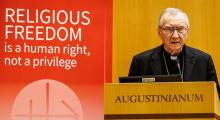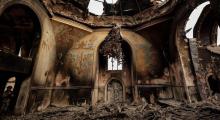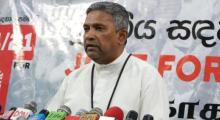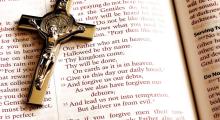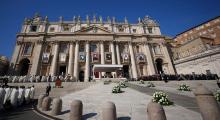Issued by the Catholic Center for Studies and Media - Jordan. Editor-in-chief Fr. Rif'at Bader - موقع أبونا abouna.org
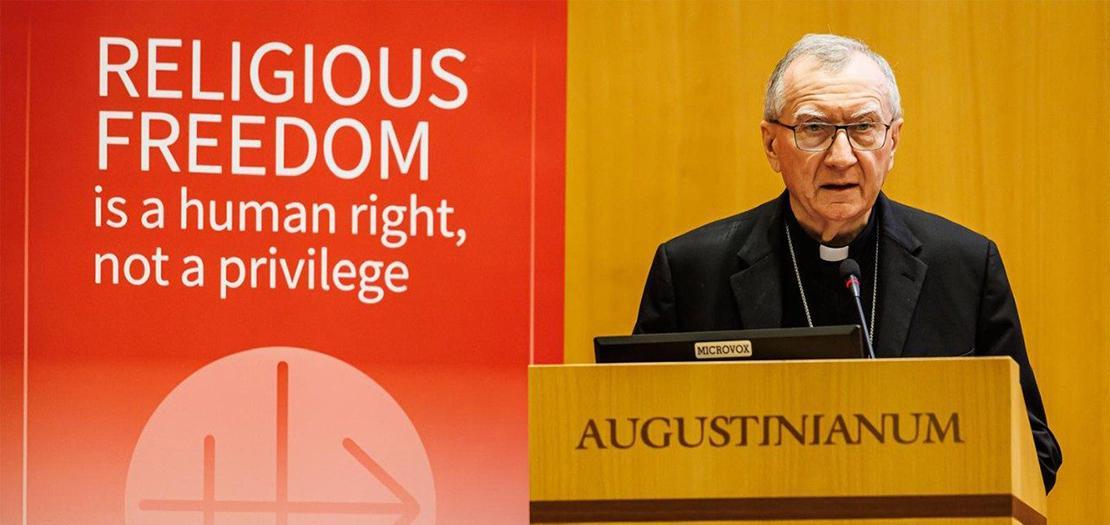
Cardinal Secretary of State Pietro Parolin highlighted “religious freedom as a fundamental aspect of human existence” in his keynote speech at the Vatican on Tuesday, 21 October, for the launch of the 2025 Religious Freedom Report by Aid to the Church in Need (ACN).
The realization of “God-given freedom,” embedded in human nature, “should not be obstructed by barriers of a personal, societal, or governmental nature,” and “men and women everywhere deserve freedom from any form of compulsion in matters of faith—whether that be subtle social pressures or overt state mandates,” Cardinal Parolin said.
“It is incumbent upon governments and communities alike to refrain from compelling anyone to violate their deeply held convictions or obstructing anybody from living them out authentically,” he continued.
The Cardinal added that “freedom does not constitute a blanket endorsement of falsehood or a permissive pass to embrace error recklessly” but rather “is an invitation to pursue truth with diligence” and that “all are called to moral accountability."
Report’s worrying results
The Secretary of State highlighted how the report, which this year marks its 25th edition, shows that “almost two-thirds of the world's population live in countries where serious violations of religious freedom take place,” meaning “around five billion four hundred million people” are affected.
“It is worrying” that the 2025 document “is the largest in size since its inception,” the Secretary of State continued, adding that it is “a valuable source of information and analysis” regarding this phenomenon.
Importance of religious freedom
Cardinal Parolin cited Pope Leo XIV’s recent speech to an ACN delegation to underline the significance of this report and how religious freedom is necessary to build peaceful societies. The Pope explained that this resource is “a powerful instrument” that “gives voice to the voiceless and reveals the hidden suffering of many,” Cardinal Parolin said.
The Pope also stated that “religious freedom constitutes not an optional but an essential bulwark,” tied to each person’s creation in the image of God, thus empowering “each soul to pursue truth and build equitable societies.”
“Without this freedom,” he warned, “the ethical fabric of society inevitably frays, leading to cycles of subjugation and conflict."
This underpins the Catholic Church's defense of religious freedom for all, which must be recognized “in the legal and institutional life of every nation.”
Religious freedom, Cardinal Parolin continued, quoting the Pope’s words, “cannot remain abstract” but “must be lived, protected, and promoted in the daily lives of individuals and communities.”
Article 18 of the Declaration of Human Rights
In his speech, Cardinal Parolin reflected on two important documents that point out the importance of religious freedom for our world. The first is the Second Vatican Council’s Declaration Dignitatis Humanae, which this year marks the 60th anniversary of its publication on 7 December 1965.
The second is its “lay counterpart,” which is "the very cornerstone of the edifice of contemporary human rights in international law,” Article 18 of the Universal Declaration of Human Rights. After “the unparalleled atrocities of World War II.”
This article explained with “crystalline precision” the importance of religious freedom and represented “a collective rejection of the totalitarian ideologies that led to the Holocaust and many other atrocities, where the sanctity of individual beliefs was systematically erased,” the Secretary of State said.
“Religious freedom is not a contingent privilege but an inalienable right, indispensable to the full realization of human potential,” he stressed, adding that ACN’s current report reveals that Article 18 is today “a fragile bulwark amidst a turbulent vortex of adversity.”
The impact of Dignitatis Humanae
Regarding Dignitatis Humanae, Cardinal Parolin outlined that this declaration “weaves a tapestry of freedom tempered by responsibility, encouraging societies to build bridges rather than erect barriers in the pursuit of truth.” He explained that this vision has since “rippled outward,” inspiring Catholic engagement in international organizations like the United Nations and “fueling movements against religious persecution.”
“It serves as a reminder that, when rightly ordered”, he continued, “freedom is not merely a right; it is also a pathway to Truth and deeper communion with God and neighbor.”
The central message of Dignitatis Humanae is “the right of the individual and of communities to social and civil freedom in religious matters,” the Cardinal said.
"Faith must be a free response to a divine invitation, and not a coerced submission,” he said, since it comes from the acknowledgement “of the inherent dignity of all human beings, who are created in the image of God.”
As the Declaration eloquently states, “truth cannot be imposed except by virtue of its own truth,” the Secretary of State said.
Role of civil authorities and international treaties
He also noted how the “principle of religious freedom permeates all aspects of human interaction, both individual and collective” and should thus “be enshrined as a fundamental civil right in constitutions, domestic laws, and international treaties.”
However, he explained, “religious freedom should not be considered an unchecked absolute” but rather “a dynamic equilibrium, bounded by wisdom and equity.”
Thus, he insisted, “political prudence” must be used to create boundaries shaped by the demands of “the common good,” and civil authorities have a “pivotal role” in promulgating legislation that is in accordance with the immutable moral law (founded upon natural reason and divine revelation).”
He emphasized how Dignitatis Humanae provides several rationales on the “necessity” for safeguards to prevent violations of religious freedom, which include protecting citizens’ rights, nurturing public peace, and upholding public morality.


